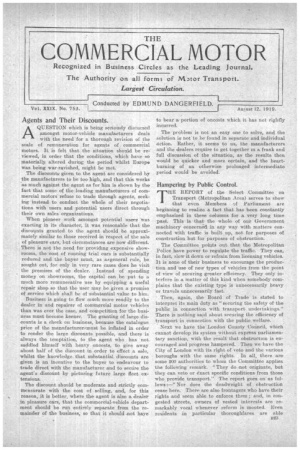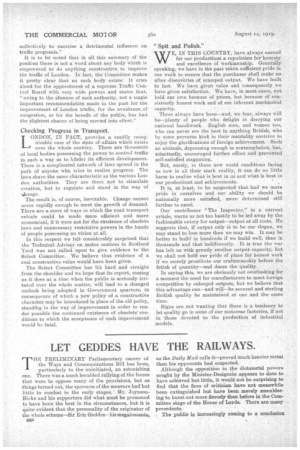Agents and Their Discounts.
Page 1

Page 2

If you've noticed an error in this article please click here to report it so we can fix it.
AQUESTION which is being seriously diecatesed amongst motor-vehicle manufacturers deals with the need for a thorough revision of the scale of remuneration for agents' of commercial motors. It is felt that the situation should be reviewed, in order that the conditions, which have so materially altered during the period whilst Europe was being war-ra,vish•ed, might be met. • The discount& given to the agent are considered by the manufacturers to be too high, and that this works 'as much against the agent as for him is shown by the fact that some of the leading manufacturers of commercial motors refuse to trade through agent; seeking instead to conduct the whole of their negotiations with users and potential users direct through their own sales organizations.
When pioneer work amongst potential usea-s was exacting in its character, it was reasonable that the discounts granted to the agent should be approximately similar to those received in respect of the sale of pleasure ears, but circumstances are now different. There is not the need for providing expensive showrooms, the cost of running trial cars is substantially reduced and the buyer must, as apgeneral rule, be sought out, for only in very rare cases does he visit the premises of the dealer. Instead of spending money on showrooms, the capital can be put to a much more remunerative use by equipping a useful repair shop so that the user may be given a promise of service which shall be of substantial value to him.
• Business is going to flow. much more readily to the dealer in and repairer of commercial motor vehicles than was ever the ease, and competition for the business must become keener. The granting of large. discounts is a check on business, because the catalogue price of the manufacturer,must be inflated in order to render the large discounts possible, and there is always the temptition, to the agent who has not saddled himself with heavy oncosts, to give away about half of the discount in order to effect a sale, whilst the knowledge that substantial discounts are given is an incentive to the buyer to endeavour to trade direct with the manufacturer and to secure the agent's discount by picturing future large fleet ex tensions, .
• The discount should be moderate and strictly commensurate with the cost of selling, and, for this ,.. reason, it is better, where the agent is also a dealer in pleasure ears, that the commercial-vehicle department should be run entirely separate from the remainder of the business, so that it should -not haye to bear a portion of oncosts which it has not rightly incurred.
The problem is not an easy one to solve, and the solution is not to be' found in separate. and individual action. Rather, it seems to us, • the manufacturers and the dealers require to get together in a frank and full discussion of the situation, as the results then would be quicker and more certain, and the heartburning of an otherwise prolonged intermediate period would be avoided.
Hampering by Public Control.
THE REPORT of the Select Committee on Transport (Metropolitan Area.) serves to Show that even Members of Parliament are beginning to realize a fact that has been constantly emphasized in these co,lunins for a very long time -past. This is that the whole of our Government machinery concern-6;d in any way with matters connected with traffic is built up, not for purposes of construction but for purposes of obstruction. .
The Committee points out that the Metropolitan Police. have power to regulate the traffic. They can, in fact, slow it down or refrain from licensing vehicles. It is none of their business to encourage the production and use -of' new types of vehicles from the point of view of securing greater efficiency. They only interfere in a matter of this kind when somebody complains that the existing type is Unnecessarily heavy or travels unnecessarily fast.
Then, again, the Board of Trade is stated to interpret its main duty as "securing the safety of the public in connection with transport undertakings." There is nothing said about securing the efficiency of transport in connection with the public welfare.
Next we have the London County Coiincil, which cannot develop its system_ withotit express parliamentary sanction, with the result that obstruction is encouraged and progress hampered. Then we have the City of London with its right of veto and the various boroughs with the same rights. In all, there are some 200 authorities to whom the Committee applies the following remark. "They do -not originate, but they can veto or exact specific conditions from those who provide transport." The report goes on as foIlows :—" Nor does the deadweight of obstruction cease here: There are also frontagers who have their rights and seem able to enforce them ; and, in congested streets, owners of vested interests are remarkably vocal whenever reform is mooted. Even residents in particular thoroughfares are able collectively to exorcise a, detrimental influence on traffic proposals."
It is to be noted that in all this summary of the position there is not a word about any body which is empowered to do anything constructive to improve the traffic of London. In fact, the Committee makes it pretty clear that no such body exists: It cries aloud for the appointment of a supreme Traffic Control Board with very wide powers and states that, "owing to the absence of such authority, not a single important recommendation made in the past for the improvement of London Waffle, for the avoidance,of congestion, or for the benefit of the public, has had the slightest chance of being carried into effect."
Checking Progress in Transport.
LONDON, IN FACT, provides a readily recognizable case of the state of, affairs which exists over the whole country. There are thousands of local bodies possessing the power to control traffic in such a way as to hinder its efficient development. There is a complicated network of laws spread in the path of anyone who tries to realize progress. The laws share the same characteristic as The various London authorities. They are there not to stimulate creation, but to regulate and stand in the way of Change,. The result is, of course, inevitable. Change cannot occur rapidly enough to meet the growth of demand. There are a score at ways in which the road transport vehicle could be made more efficient and more economical, if it were not for the eXistenee of obsolete laws and unnecessary restrictive.powers in the hands of people possessing no vision at all. . In this respect we felt considerably surprised that the TechnicalAciviKr, on motor matters to Scotland Yard was not called upon to give evidence to the Select Committee. We laelieve that evidence of a real constructive value woUld have been given.
The Select Committee has hit hard and straight from the shoulder and we hope that its report, coming as it does at a time when the public is seriously irritated over the whole matter, will lead to a changed outlook being adopted in Government quarters, in consequence of which a new policy of a constructive character may be introduced in place of the old policy, standing in the way of improvement in order to render possible the continued existence of obsolete' conditions to which the acceptance of such improvement would be fatal.
"Spit and Polish."
WE, IN THIS COI7NTRY, have always earned for our productions a reputation for honesty and excellence of workmanship. Generally speaking, we have in the past taken sufficient pride in our work to -ensure that the purchaser shall make no after diseovZries ,of scamped output. We have built to last. We have given value and consequently we have given satisfaction. WQ have,in most cases, not held our own because of prices, but because Of -consistently honest work and of our inherent mechanical.
capacity. .
There always have been—and, we fear, always will be—Plenty of people who delight in decrying our national handiwork. English men, and women too, who Can never see the best in anything British, who by some perverse kink in their mentality contrive to enjoy the glorifications of fOreign achievement. Such an attitude, depressing enough in contemplation, has, admittedly, encouraged further effort and prevented self,satisfled stagnation. . But, surely, in these new world conditions facing us now in all their stark reality, it can do no 'little harm to realize what is best in us and what is best in our produetiont and achievements. , It is, at least, to be suspected that had we more pride in -ourselves and our ability we should be nationally more satisfied, more determined still ' further to excel.
Our contributor "The Inspector," in a current article, warns us not too hastily to be led away by the fashionable outcry for output—output at all costs. He suggests that, if output only is to be our slogan, we may stand to-lose more than we may win. It may be better to build in hundreds if we build well, than iu. thousands and that indifferently. It is true the war has left us with greatly swollen output capacity, but we shall not hold our pride of place for honest work if we merely prostitute our craftsmanship before the fetish of quantity—and damn the quality.
In saying this, we are obviously not overlooking for a moment the need for manufacturers 0 meet foreign competition by enlarged outputs, but we believe that. this advantage can—and will—be secured and sterling British quality be maintained at one and the same time.
Signs are not wanting that there is a tendency to let quality go in some of our motorcar factories, if not in those. devoted to the production of industrial. models.
























